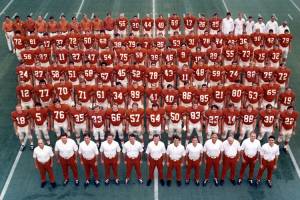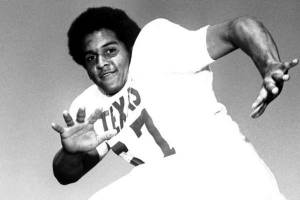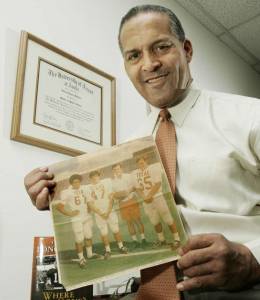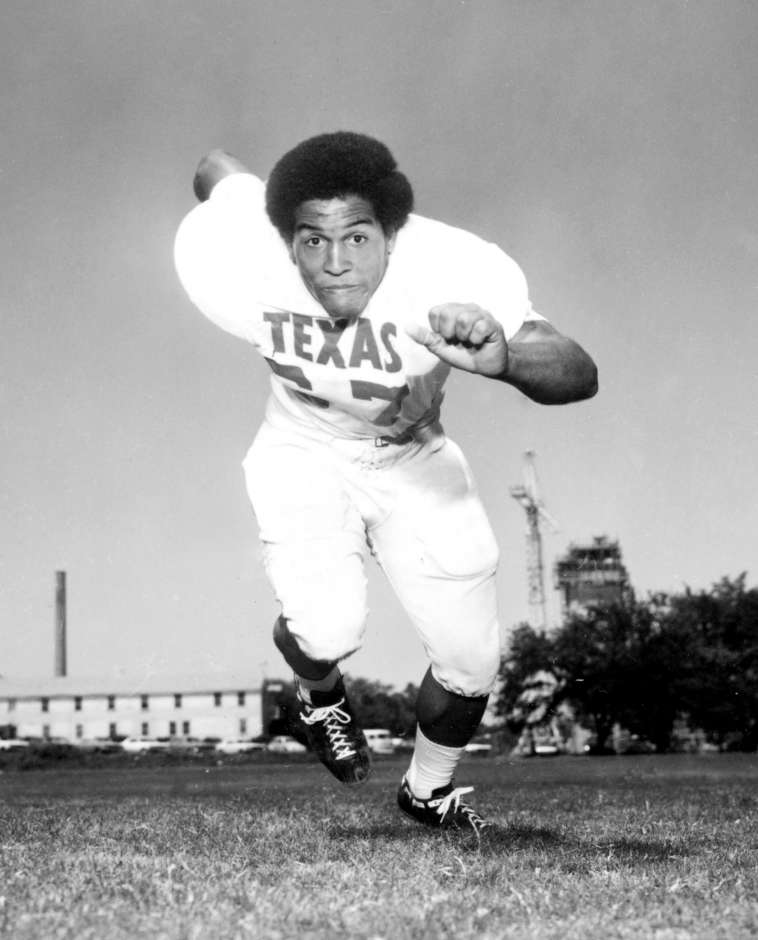Tuesday marked the end of the life of Julius Whittier, a significant person in University of Texas history. Before him, there had never been an African-American varsity football player at UT. All of his predecessors had been European-American, along with a few Mexican-Americans.
I had the honor of meeting him thrice. First, we were in a pickup basketball game at Gregory Gym. Second, we played handball—also at Gregory Gym. Those encounters were in 1972 or 1973. Finally,  when SMU opened its new Gerald J. Ford Stadium in 2000, he was there. We had the opportunity to talk before the Mustangs and Kansas Jayhawks kicked off. He knew about my 1987 book, Breaking the Ice / Racial Integration of Southwest Conference Football, but did not remember us playing hoops and handball during our student days; I did not expect him to. Whittier was a striking guy and not because he was big. He was my height, although considerably huskier. He was effusive, articulate and joyous. One could not help being affected by him. Julius Whittier was a happy person who made others happy.
when SMU opened its new Gerald J. Ford Stadium in 2000, he was there. We had the opportunity to talk before the Mustangs and Kansas Jayhawks kicked off. He knew about my 1987 book, Breaking the Ice / Racial Integration of Southwest Conference Football, but did not remember us playing hoops and handball during our student days; I did not expect him to. Whittier was a striking guy and not because he was big. He was my height, although considerably huskier. He was effusive, articulate and joyous. One could not help being affected by him. Julius Whittier was a happy person who made others happy.
Blazing a trail in Austin
Of course, many tributes have been written about him in the past week and here I am adding mine. He came from San Antonio, graduating from Highlands High School in 1968. Although I do not know for sure, he must have endured some Jim Crow moments and attended segregated schools in his early years. His parents were active in the San Antonio NAACP chapter, picketing and protesting injustice wherever they saw it. Darrell Royal (I know, I’m supposed to call him “the legendary,” but no can do) sent assistant coach Mike Campbell to recruit him. A scholarship was offered and accepted, and Whittier headed to Austin. As a freshman and on the varsity, he worked out  ferociously. During practices, he made sure the coaches noticed him. It would have been easy to get lost or overlooked on those huge squads, and he took no chances. When a drill was about to start, Whittier did not hang back and let others go first. He jumped up and showed the coaches—and fellow players—that he could hit. More than anything else, football is about hitting. As Vince Lombardi once said, “Basketball and baseball are contact sports. Football is a collision sport.” Whittier was able and willing to get in there and bang.
ferociously. During practices, he made sure the coaches noticed him. It would have been easy to get lost or overlooked on those huge squads, and he took no chances. When a drill was about to start, Whittier did not hang back and let others go first. He jumped up and showed the coaches—and fellow players—that he could hit. More than anything else, football is about hitting. As Vince Lombardi once said, “Basketball and baseball are contact sports. Football is a collision sport.” Whittier was able and willing to get in there and bang.
Change was coming to the Forty Acres. Consider that by 1983, just 15 years after Whittier signed, UT offered 21 scholarships. Seventeen of them went to African-Americans, and just four went to European-Americans.
Whittier probably knew about E.A. Curry, Robinson Parsons, Talmadge Blewitt and Leon O’Neal, Jr. All were black and had worn the orange and white, but just for the freshman team. Curry, Parsons and Blewitt were walk-ons, whereas O’Neal had been a scholarship player. None reached the varsity, however. I certainly respect those four gentlemen who wanted and fought to be Longhorns, but playing among the frosh does not count. Whittier took that final step, making the team as an offensive lineman and tight end in the 1970, 1971 and 1972 seasons. Indicative of the one-dimensional offense DKR had in those days is the fact that Whittier caught Texas’ only touchdown pass of 1972—a 4-yard toss from Alan Lowry in a 38-3 defeat of the Aggies on Thanksgiving night.
A jock and a scholar
Royal, no more eager to integrate than he was to throw the ball, liked to say he could not find any academically competent black players. This is absurd. Black guys from Texas had been going out of state (to Iowa, Washington, UCLA, Missouri, Arizona State, Wichita State and Michigan State, among others) and succeeding on the field and in the classroom since the 1930s. Jerry LeVias was an academic all-American at SMU, and  his work as a receiver and kick returner for the Ponies is rather well known. Whittier graduated in 1974, got a degree from the LBJ School of Public Affairs and another from the UT Law School. He moved to Dallas, was hired as an assistant district attorney and went into private practice.
his work as a receiver and kick returner for the Ponies is rather well known. Whittier graduated in 1974, got a degree from the LBJ School of Public Affairs and another from the UT Law School. He moved to Dallas, was hired as an assistant district attorney and went into private practice.
Alzheimer’s disease had begun to lay him low in recent years. Emaciated, he struggled to give an acceptance speech when he was inducted into the Longhorn Hall of Honor in 2013. The very next year, his sister Mildred filed a $50 million lawsuit on his behalf against the NCAA claiming that his condition could be traced to those four seasons as a college football player.
Whittier dealt with more than concussions. Some of his European-American teammates at UT would have been happy to continue on with Jim Crow football and did not want him there. Once, when Royal criticized him for jumping offsides, Whittier snapped and accused him of racism. But any anger or bitterness was seemingly left behind in later years. “Many people, in terms of marking milestones in their lives, reflect on struggle and strife and difficulty and privation,” Whittier said during a 2005 interview with the Houston Chronicle. “I had none of that. I picked a school. I went there. I started as a freshman on the freshman team. I think I deserved it. I got the grades that I deserved, based on the effort that I gave. I had access to the powers that be. I had chances to talk to LBJ…. [That’s] where I matured, learned discipline and, most importantly, learned how to play football on a winning team.”


12 Comments
Thanks Richard. Good tribute. I used to see him riding his bike around campus, meandering through hoards of people like they weren’t there.
The Southwest Conference needed Hayden Fry and Jerry LeVias in those times to open up the door for a Julius Whittier at Texas. That part of the plan was long overdue.
Long overdue is right, Steve. Royal would have waited another decade or two if had not been forced into it.
Your esteem for Julius was profoundly evident in this story. People are people. We are not objects. We are not one color or another. You have a big heart and a very objective perspective on this subject.
I am glad that Julius was capable of combining his intellect and physicality to achieve all his goals. DKR and the Longhorns made the playing field level for him to make these achievements not only on the gridiron but in life as a wonderful person and renown person of interest with his many achievements in his practice of law. Too, I feel certain that he has made additional social, and individual impacts that you didn’t have the space to elaborate upon.
His stamina and courage are admired. As seen in all your articles and books on the subject of college football in the 50s, 60s and 70s, the immense racial obstacles that were at the forefront of the civil rights era are shameful and unforgivable for any people groups/nations. Sports was a gateway for many, many individuals to break down many of our nation’s social injustices/hatreds/paradigms.
Great story.
Thanks, Gary. I am grateful to have had even a little contact with this unforgettable Longhorn.
Thank you for your story about one special Longhorn.
Thank you, Coach. I wonder if people told you about him during your stay in Austin.
A fine expose of a true student-athlete. Thanks for sharing it with us, Richard.
Bob, thanks for reading and offering a comment. I can honestly say I loved Julius Whittier.
Hi Richard- I am not familiar with Whittier, but I’m sure I was back in the day. He was clearly a very accomplished man, athletically and academically, as well as a pioneer in breaking down the racial barriers we had then. Thanks for letting us know about him. Kevin
He used to joke that he caught every touchdown pass in the 1972 UT football season, and it was true. He caught the ONLY one. I mentioned playing pickup hoops with him once in Gregory Gym. I could not help noticing his beautiful physique–he was not tall, but he had perfect proportions….muscled legs, thin waist, broad shoulders. This guy was a jock!
Great story, very sad about the Alzheimers. I am glad he had a good life after football.
Thanks for your comment, you lucky retiree!
Add Comment